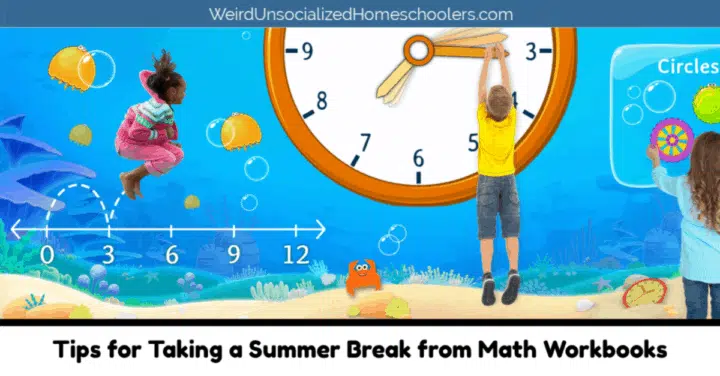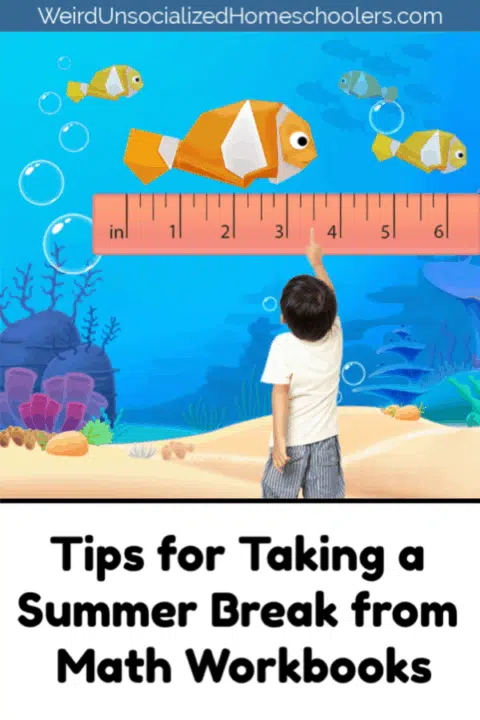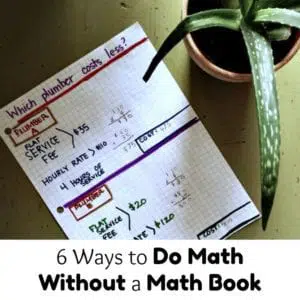Tips for Taking a Summer Break from Math Workbooks
Whether it’s summer break or you’re just burned out, sometimes you and your kids need a break from math workbooks, but that doesn’t mean you have to let math slide. Try these ideas for keeping math skills sharp while you take a break from math worksheets.
It’s summertime. You’re ready for a break from teaching math as much as your kids are ready for a break from learning it. But you worry that if you put the workbooks aside until August or September, those hard-earned skills will get rusty.
Or maybe you school year round, but you’re looking for a more relaxed approach to math during the summer months. Is it worth it to take a break from math workbooks this summer?

Benefits of Taking a Break from Math Workbooks
Early in our homeschooling experience, someone introduced me to the idea of allowing time for lessons to percolate in a child’s mind. The idea is that even while a child is taking a break from actively learning or practicing a new concept, their brain is still thinking about and processing that information.
I’ve seen that proven time and again in our homeschool. Instead of pushing a difficult concept, I often saw more significant results in letting the kids take a break from it for a while. {I’m looking at you, long division.}
Other benefits of taking a break from textbooks and worksheets include:
- Stress reduction
- Improved focus after a break
- Time and opportunity for real-world practice and connections
With all the benefits of taking breaks from formal learning, summer slide – or forgetting previously learned facts and skills during long breaks– is a genuine concern for teachers and homeschooling parents.
So, how do you capitalize on the benefits of taking a break without losing ground academically?
How to Practice Math Without Worksheets
Math is all around us and part of our everyday lives. That fact makes it easy to practice math skills without drills and textbooks. Just try some of these ideas!
Board Games
Board games are an engaging way to keep math skills sharp while still enjoying a break from math worksheets. Games allow kids to explore math concepts in fun ways without the stress of grades.
Games also help kids improve their strategic thinking and problem-solving skills. And, they build fluency in mathematical thinking in ways that drills and worksheets can’t.

Real-world Application
Summer and other long school breaks provide an excellent opportunity for kids to apply math in real-world scenarios. Try activities such as:
- Let your kids run a summer business (a lemonade stand, babysitting, or dog walking, for example)
- Give kids a grocery list, some cash, and a stack of coupon circulars. They get to keep the money that they save through smart shopping and budgeting.
- Provide the materials for a building project such as a birdhouse or bookshelf. Let your kids do to the planning and measuring.
- Bake together
- Let your kids help you plan your vacation travel expenses such as food and fuel
- Encourage your kids to keep stats on their favorite sports star
Kids often see math as just a school subject and fail to realize all the ways they use those skills every day. Help them understand that math is all around them.
Online Math Games
Online math games and apps are a fantastic way for kids to keep their math skills sharp. Most play in a video game style that kids are familiar with, making the games exciting and entertaining. Instead of feeling like they’re practicing math, kids get to enjoy a summer boredom buster.
Online games such as Splash Math let kids take a break from math workbooks while targeting specific, grade-level math skills. Kids practice these skills in the format of colorful, engaging gameplay that they can access on both desktop and iOS mobile devices.
How Splash Math Combats Summer Slide
Splash Math uses colorful, interactive games and rewards to make math practice fun for kids in grades K-5. Kids earn coins to buy and collect animated pets as they play games personalized to their specific needs. The games are available off-line, so an internet connection isn’t required for kids to play.

Questions are read aloud so emergent or struggling readers can enjoy the games, and kids get familiar with mathematical vocabulary. And, Splash Math offers immediate feedback and explanation of incorrect answers.
Parents can stay connected through weekly progress reports, email support, and through the Parent Connect App.
Splash Math helps kids practice skills in:
- addition and subtraction
- multiplication and division
- algebra and geometry
- measurement
- fractions and decimals
- money
- place value
Parents can sign up for free to learn more about what is available for each grade level along with plans and pricing.
So, if you’re looking for a way to take a summer break from homeschool math workbooks without dealing with the effects of summer slide next fall, check out Splash Math and see if it’s a good fit for your family.
You Might Also Like
Kris Bales is a newly-retired homeschool mom and the quirky, Christ-following, painfully honest founder (and former owner) of Weird, Unsocialized Homeschoolers. She has a pretty serious addiction to sweet tea and Words with Friends. Kris and her husband of over 30 years are parents to three amazing homeschool grads. They share their home with three dogs, two cats, a ball python, a bearded dragon, and seven birds.





